What's happening in Parliament next week?
- Published
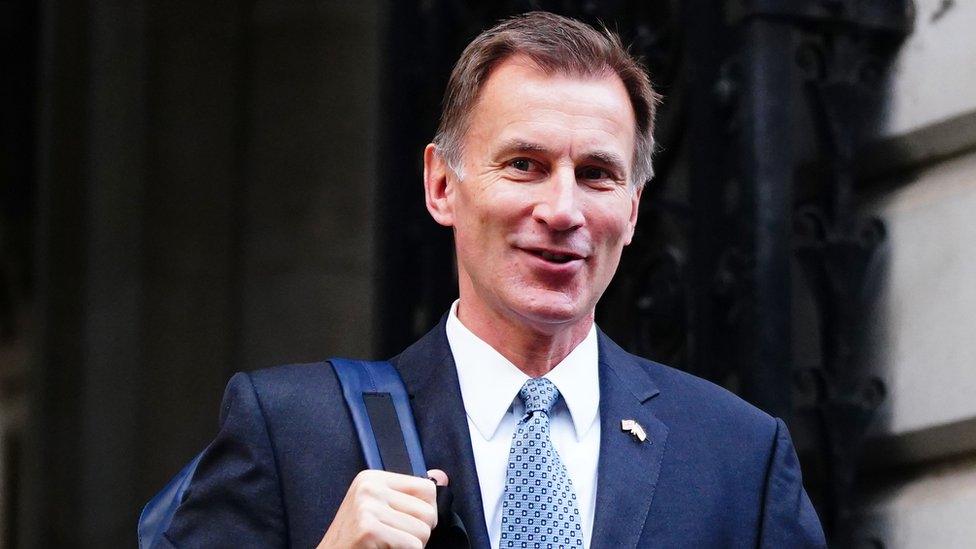
Chancellor Jeremy Hunt is gearing up for his Autumn Statement
The week's drama is backloaded to Thursday, when Chancellor Jeremy Hunt will deliver his Autumn Statement, his package of tax rises and spending cuts to restore long-term market confidence in the UK's finances.
This is going to be a major event, probably the defining political event up to the next election, so expect a noisy and confrontational Commons.
The lead-up is a mostly humdrum diet of general debates and low-key law-making, perhaps with legislation to postpone the Northern Ireland Assembly elections dropped in somewhere along the way.
And keep an eye out for some of the big-ticket legislation currently missing in action, in particular the eagerly-awaited Online Safety Bill which ministers are apparently rethinking.
Meanwhile, more select committee chairs are up for election. Jonathan Gullis, David Simmonds and Robin Walker are vying to succeed Robert Halfon in Education, and six candidates are seeking to succeed Huw Merriman in Transport: Jack Brereton, Jackie Doyle-Price, Katherine Fletcher, Chris Loder, Karl McCartney and Iain Stewart.
The voting will take place with the results announced later in the afternoon.
Monday 14 November
Commons: Home Office Questions at 14:30, after which there will be a general debate about the Australia and New Zealand trade deals.
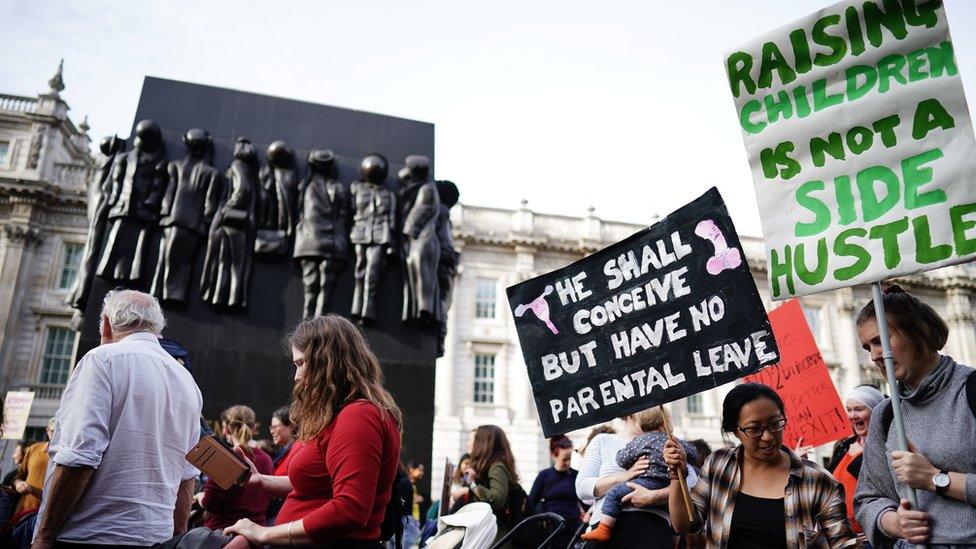
Demonstrators march in a protest in central London demanding reform of childcare, parental leave and flexible working
Westminster Hall: At 16:30, MPs will debate an e-petition which argues the government should not reduce the existing adult-child ratios in early years childcare. The petition attracted 106,903 signatures.
Committees: Foreign Secretary James Cleverly has his first meeting with Foreign Affairs Committee (16:00), while Public Accounts (16:00) considers the Defence Digital Strategy - how Britain's armed forces are acquiring cyber-warfare and information-handling capabilities.
Lords: At 14:40, two new peers take their seats: Labour's Fiona Twycross, Deputy Mayor of London, and Michael Hintze, hedge fund manager and Conservative donor. Questions will include the Green Party's Baroness Jones asking why there has been a delay in water companies producing their plans for dealing with sewage discharges.
The main event is the final committee stage day on the Higher Education (Freedom of Speech) Bill.
Tuesday 15 November
Commons: Treasury Questions at 14:30 - watch out for a debut intervention from new Treasury Committee Chair Harriet Baldwin - after which the main debate will be on a Labour motion, to be announced.
Ten Minute Rule Bill: Plaid Cymru's Westminster leader Liz Saville Roberts wants to create a commission to look at the way the tax system impacts different groups in society. It would look at issues like non-dom status, increasing taxes on high-profit industries, and equalising tax rates on income whatever its source.
Adjournment: Labour's Richard Burgon leads a debate on the merits of enabling the public to call a general election.
Committees: Business, Energy and Industrial Strategy (10:15) hears from witnesses from Amazon and Zoom, as well as from trade unions Prospect and the GMB, in its inquiry into post-pandemic economic growth and the labour market. Public Administration (10:00) looks at how the Lobbying Act 2014 is working.
Lords: At 14:30, peers will be asked to approve another job lot of orders and regulations: University Institutes, Social Workers, Pensions Dashboards, Financial Services, Police and Crime Commissioner Elections, Assistance with Voting for Disabled People, Prescribed Persons (Reports on Disclosures of Information), and Climate Change (Targeted Greenhouse Gases).
There will also be a short debate on calls for peace talks between Eritrea and Ethiopia.
Wednesday 16 November
Commons: Scottish Questions at 11:30 will be followed by Prime Minister's Questions.
The main debate will be on the report stage of the National Security Bill - the point at which MPs can put forward changes. The bill updates existing espionage laws and make it harder for hostile states to steal information for commercial or political advantage. or to interfere in British society covertly.
An interesting change is being mooted by Labour's Chris Bryant, who chairs the Standards Committee. He wants people convicted of illegal work for a foreign power to be disqualified from sitting in Parliament - in part this reflects his committee's long-standing queasiness about foreign powers using all-party parliamentary groups to influence Westminster.
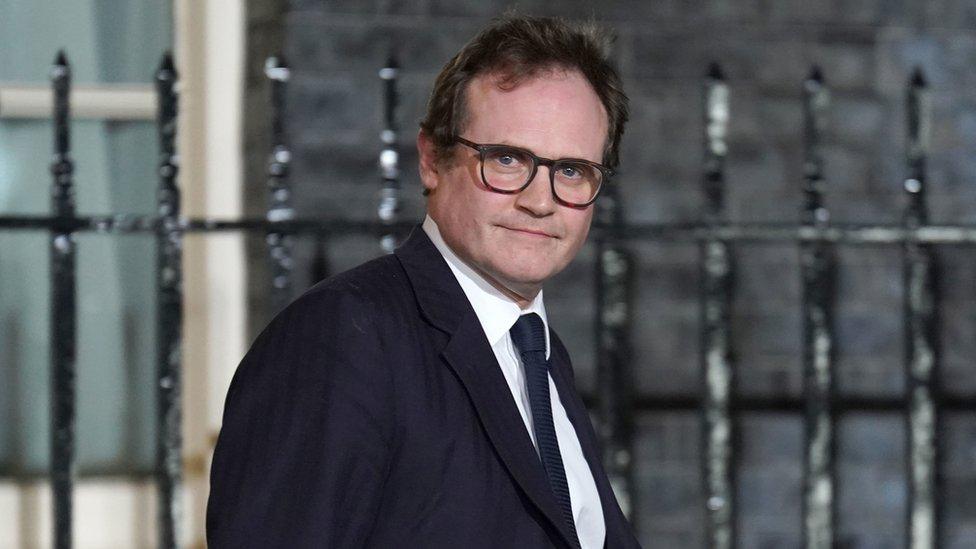
Tom Tugendhat is steering the National Security Bill into law
Similar concerns were expressed by Security Minister Tom Tugendhat, now guiding the bill through Parliament, in his previous incarnation as chair of the foreign affairs committee; it will be interesting to see how he responds.
Ten Minute Rule Bill: Labour MP Alex Norris will propose imposing on the government a new duty to promote the safety and well-being of teenagers.
Committees: Work and Pensions (09:30) takes expert evidence on the Plan for Jobs and employment support; Women and Equalities (14:30) focuses on sexism and inequality in football; and Human Rights (15:00) has a session on asylum seekers
Lords: At 15:00, peers will hold the first of two committee stage days on the Public Order Bill.
Thursday 17 November
Commons: Environment Food and Rural Affairs Questions, from 09:30, with new Secretary of State Therese Coffey, will be followed at 10:10 by mini question times for the MPs who speak for the Church Commissioners, the Parliamentary Works Sponsor Body (about the plans for a multi-billion pound restoration of the Victorian Palace of Westminster), the Public Accounts Commission, and the Electoral Commission.
The main business will be Chancellor Jeremy Hunt's Autumn Economic Statement.
Westminster Hall: New Foreign Affairs Committee Chair Alicia Kearns leads a debate on the committee's report, "The cost of complacency: illicit finance and the war in Ukraine".
Lords: From 11:00, peers will debate subjects raised by Lib Dem peers - on long Covid, and the problems affecting tenures in the housing market in England - plus there'll be a short debate on celebrating national women's sports.
Friday 18 November
Commons: From 09:30, MPs will debate second readings of a series of private members' bills - new laws proposed by backbench MPs. First is Conservative Bob Blackman's Supported Housing (Regulatory Oversight) Bill, which deals with the specialised social housing used for prison leavers, recovering addicts, refugees, and those fleeing domestic violence.
It gives local councils new powers to drive out poor practice following a report by the Levelling Up select committee, of which he is a senior member. The committee has even held a scrutiny session to go through the bill in detail. This is the second time Mr Blackman has tried to put committee recommendations into law, after his Homelessness Reduction Act in 2018.
That's followed by Labour MP Alex Cunningham's Terminal Illness (Support and Rights) Bill, which would require utility companies to provide financial support to customers with a terminal illness, and the SNP's Chris Stephens's Corporate Homicide Bill.
Lords: From 10:00, peers will also debate private members; bills, starting with the second reading of Conservative constitutionalist Lord Norton of Louth's House of Lords (Peerage Nominations) Bill. This aims to give real teeth to the House of Lords Appointments Commission (HOLAC)'s role, by requiring the prime minister to wait until it has advised on whether an individual nominated for a peerage has "conspicuous merit" and a "willingness and capacity to contribute".
With two sets of nominations incoming from prime ministerial resignation honours lists, this is particularly well-timed. I doubt even Lord Norton expects this bill to become law, but it might prod ministers a bit.
Next will be committee consideration of the Clean Air (Human Rights) Bill from the Green Party's Baroness Jones of Moulsecoomb.
Lib Dem peer Lord Redesdale is planning to strip out most of the content of his Climate and Ecology Bill, honing it down to a simple commitment to reverse biodiversity loss, based on the argument that this will make the measure harder for the government to resist.
Finally, there's the committee stage for Conservative Lord Hayward's Ballot Secrecy Bill which aims to curb so-called 'family voting', where other members of a family accompany voters into polling stations, particularly women, and pressure them to vote a particular way.
Related topics
- Published11 November 2022
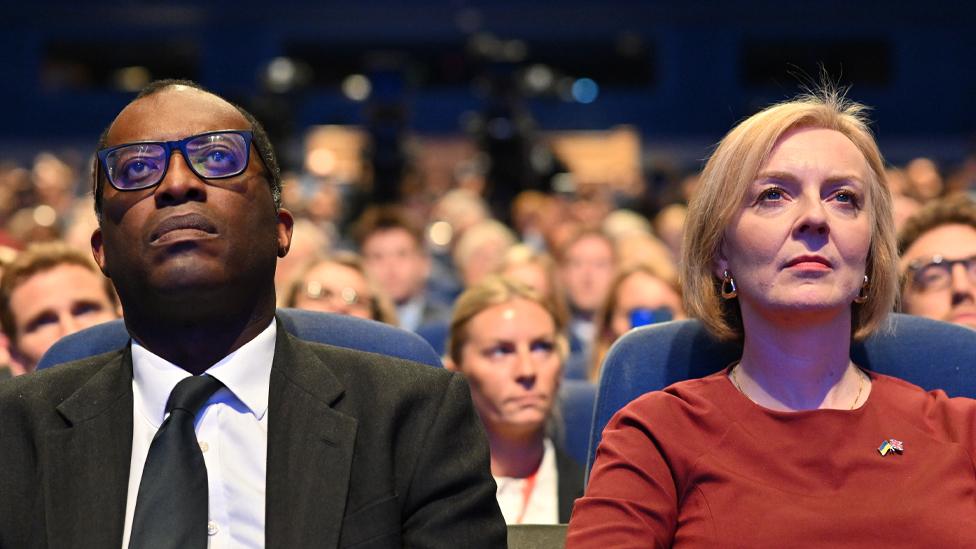
- Published11 November 2022
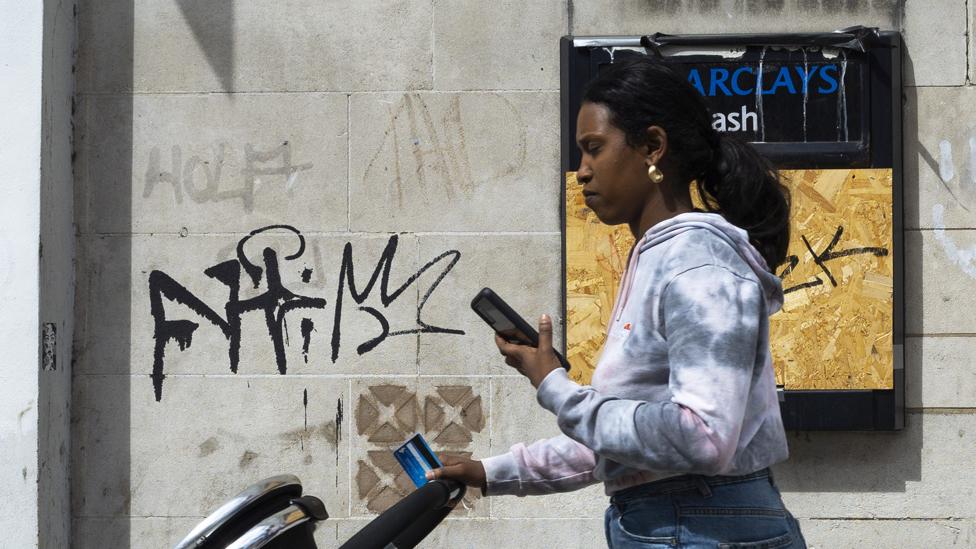
- Published17 November 2022

